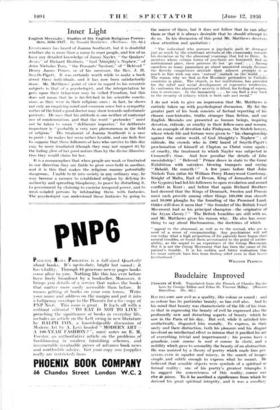Inner Light
EVERYBODY has heard of Joanna Southeott, but it is doubtful whether she is more than a name-to most people, and few of us have any detailed knowledge of Jamei Nayler, " the Quakers' Jesus," of Richard Brothers, " God' Almighty's Nephew," of John Nicholas Tom, " the Peasauts7liaVioui," of "Ilekived " Henry James Prince, or of his successor, the Rev. J. H. 'Smyth-Pigott. It was certainly worth while to 'make a book about these individuals, and it has now been satisfactorily -done. Mr. Matthews' point of view in regard to his eccentric subjects is that of a psychologist, and the interpretation he puts upon their behaviour may be called Freudian, but this does not mean that he is far-fetched in his scientific conclu- sions as they were in their religious ones : in fact, he shows not only an enquiring mind and common sense but a sympathy rather of the kind a good doctor may show towards unfortunate patients. He says that his attitude is one neither of amtempt nor of condemnation, and that the word " pretender " must not be taken to mean. " deliberate impostor," for .delibeinte imposture is '' probably a very rare_ phenomenon in the field of religion." His, treatment of Joanna Southcott is's case in point : he makes her seem rather lovable, and one feels free to suppose that those followers of hers who survive to this day may be more irradiated (though they may not suspect it) by the fading glow of her good nature than by the divine illumina- tion they would claim for her.
It is a coimminplace that when people are weak or frbstrated in one direction they arc liable to grow over-boll in another, and it is this that makes the religious maniac potentially dangerous. Unable to fit into society in any ordinary way, he may become a menace to established religion by defying its authority and spreading blasphemy, to peace by distntbing it, to government by claiming to exercise temporal power, and to weak-minded persons by infatuating them with fantasies. The psychologist can understand those fantasies by going to the source of them, but it does not follow that he can allay them or that it is always desirable that he should attempt to do so. In his discussion of this point Mi. Matthews deserves close attention and quotation : " The individual who pursues a psychotic _path itr* deranged just as much by the intolerant attitudo_of_tha community towards his deviation as by the abnormal yearnings that led to them. In societies where certain forms of psychosis. are liatioluid;' find an institutional place, their patients do not ' go mad.' . ::Among ourselves so many paranoiacs go about–annotieed simply_becausc the fiercely competitive attitude their ailment pronipts is so much in line with our own ' normal.' outlook on the,wOrld. . The reason why we find so few Messianic .pretenders in Catholic countries is plain. The church, in her" instiftitioris,'hie provided for the relief and social development of regressive tendencies. In confession the abnormal's anxiety is lifted, his feeling of separa- tion is overcome. In the monastery . . . he can find a way back to the security of infancy which is both safe and social."
I do not wish to give an impression that Mr. Matthews is entirely taken up with psychological discussion. By far the greater part of his book consists of factual reporting of his chosen case-histories, truths stranger than fiction, and our English Messiahs are presented as human beings, inspiring devotion, ridicule, or cruelty in their fellow-men and women. As an example of devotion take Finlayson, the Scotch lawyer, whose whole life and fortune were given to " his championship against the entire world, of God Almighty's Nephew " ; of ridicule, the crowds who in 1902 heard of Smyth-Pigott', proclamation of himself at Clapton as Christ come again ; of cruelty, the treatment to which Nayler was subjected in Cromwell's time. And how peculiar the details of false messiahship ! " Beloved " Prince drove in state to the Great Exhibition with outriders blowing trumpets and crying " Behold, He cometh ! " A few years before that John Nichols Tom (alias Sir William Percy Honeywood Courtenay, Knight of Malta, Earl of Devon, King of Jerusalem and of the Gypsies) had led his followers to open revolution and armed conflict in Kent ; and before that again Richard Brothers had decreed that the Kings of Denmark, Sweden and Prussia must each provide among other things 100,000 iron shovels and 10,000 ploughs for the founding of the Promised Land.
Odder still does it seem that " the founder of the British Israel Movement had as his principal champion—the originator of the Aryan theory ! " The British Israelites are still with us, and Mr. Matthews gives his reason why.. He also has some- thing to say about Buchnianisrn, the doctrines of which appeal to the abnormal, as well as to the normal, who are in need of a sense of companionshiji. Any psychiatrist will tell one today what a high proportion of his patients have begun their mental troubles; or found them accentuated to the point of intoler- ability, as the sequel to an experience of the Group Movement. But it is not the Group Movement that has been the cause of the patient's trouble. It is his sudden and bitter realisation that his inner solitude bars him from finding relief even in that lavish brotherhood."
WILLIAM PLO3IEIL






















































 Previous page
Previous page